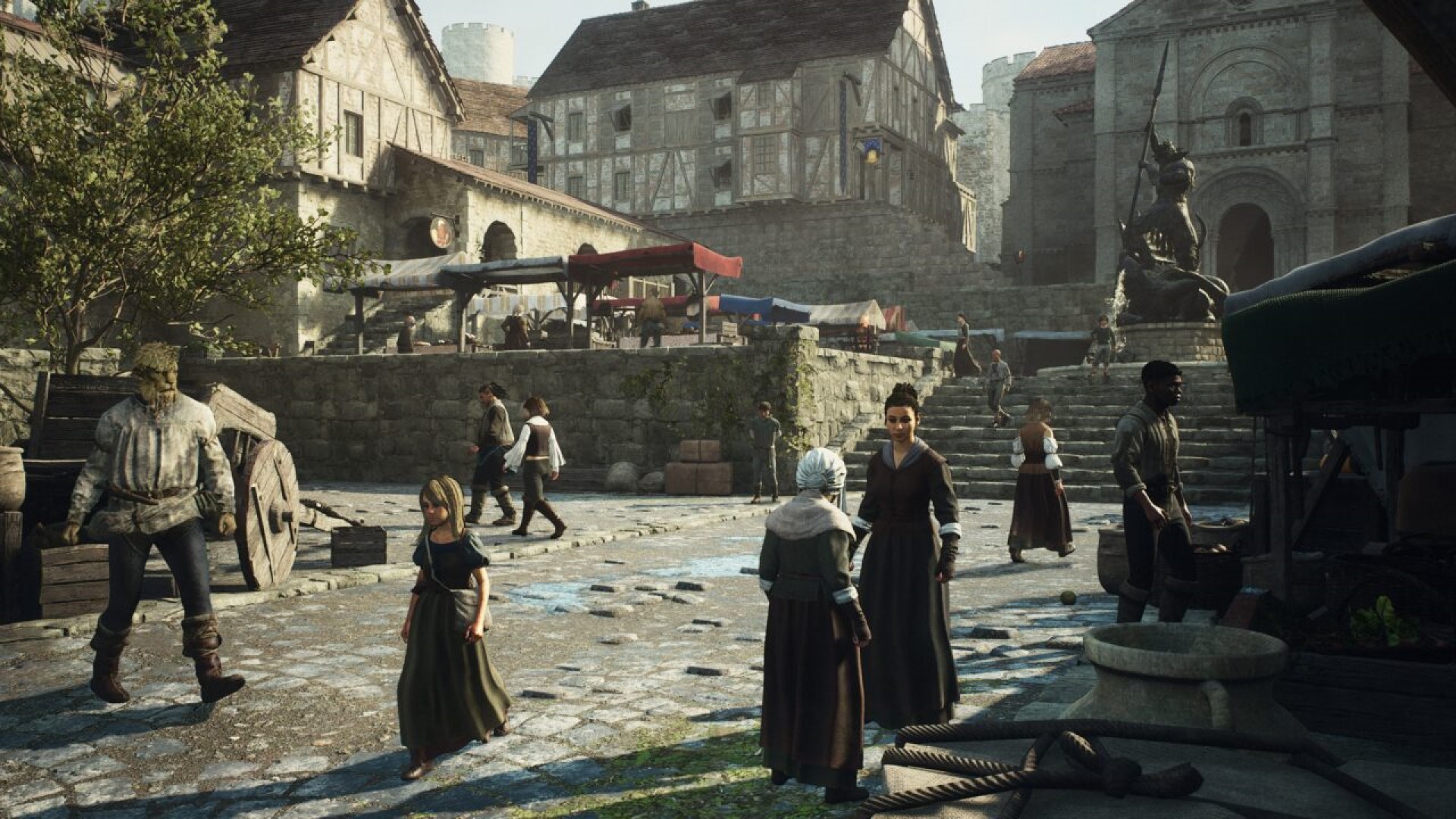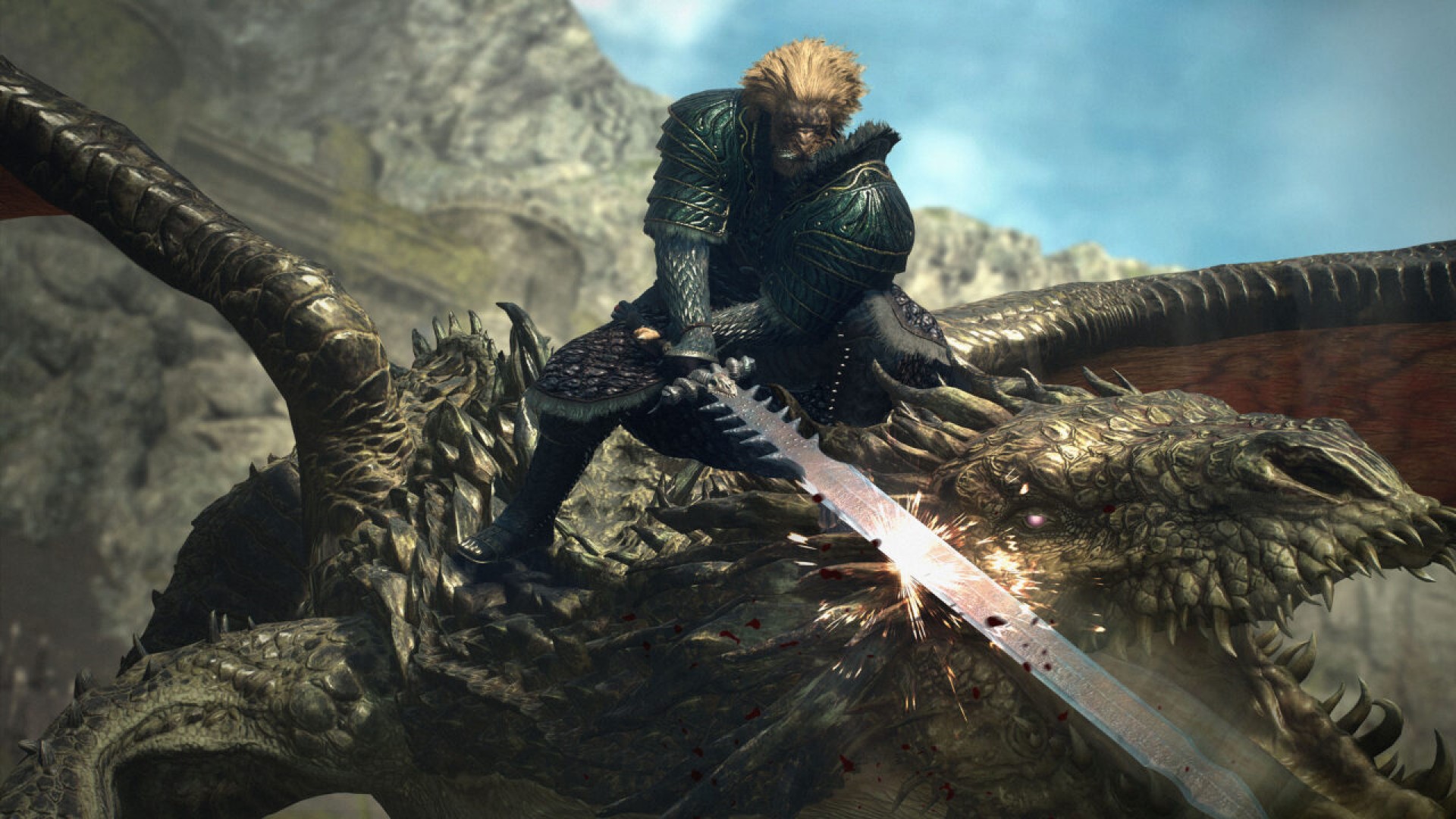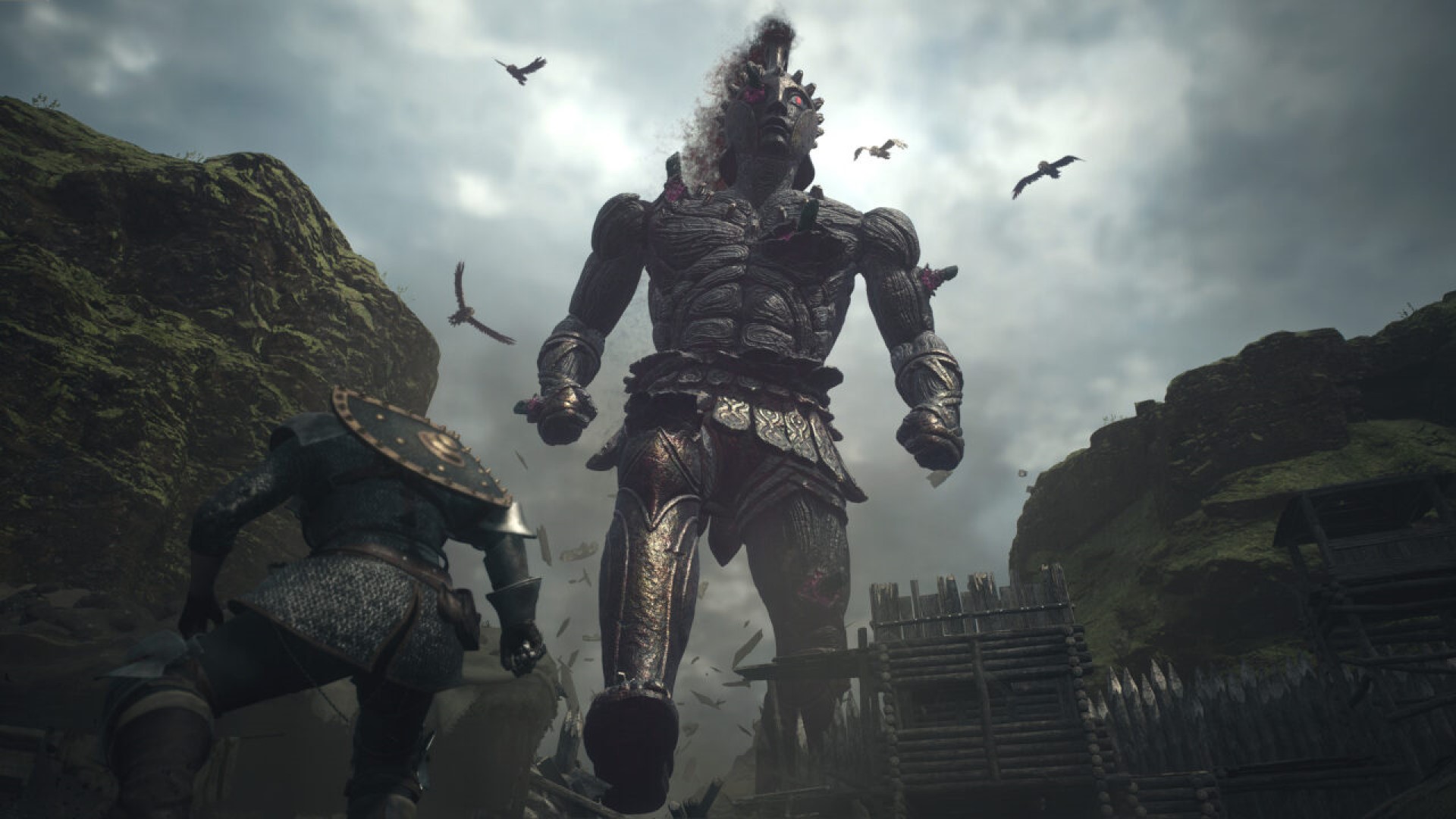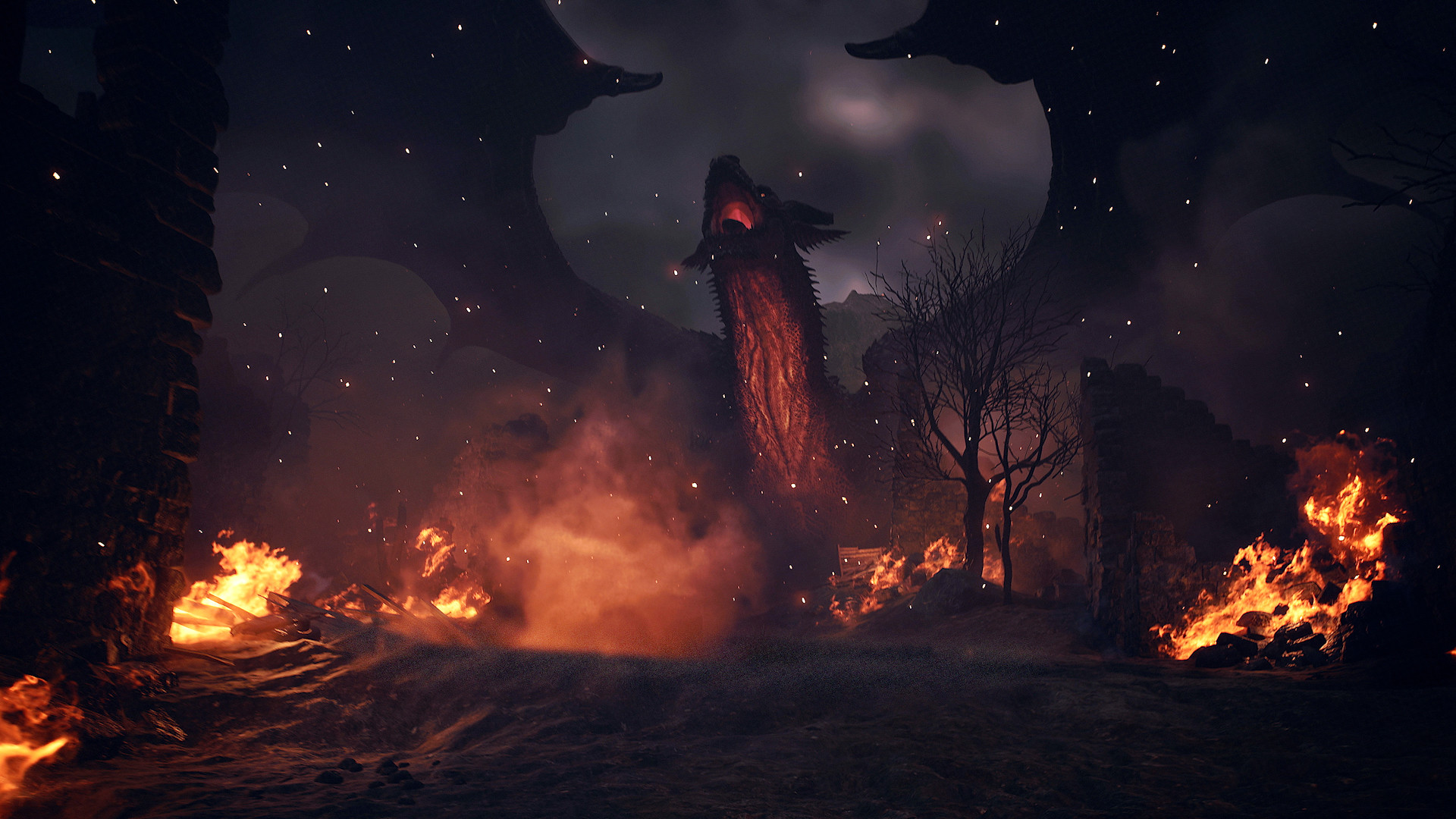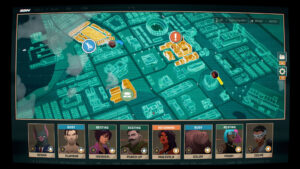
Skyrim. Metal Gear Solid 5. Breath of the Wild. Tears of the Kingdom. Every so often we get that rare gem of a game that comes along and shows what open world experiences can be when they choose to focus on density of systems rather than density of scripted, guided content. With a multitude of systems interacting with each other to constantly surprise players in unique ways, these games deliver a brand of emergent gameplay that instantly solidifies them as the standard for the entire medium to aspire to. Dragon’s Dogma 2 has firmly placed itself in that category for me.
Capcom has crafted a world that is not only vast, gorgeous, and brimming with things to do, but one that also prides itself immensely on how it puts players in control of their own experience. Rather than relying on scripted, cinematic beats, it instead props up the interactivity of its systems, and the emergent, dynamic moments they so frequently make for, which can range from being unintentionally hilarious to heart-poundingly thrilling, to the extent that they can almost feel like heavily produced cinematic set-pieces. This is a game that’s dedicated, above all else, to letting you fully immerse yourself in its reality and carve your own mark into its world, and thanks to the core strength of its foundations, no matter how you choose to do that, chances are the game will keep finding ways to surprise you.
"Capcom has crafted a world that is not only vast, gorgeous, and brimming with things to do, but one that also prides itself immensely on how it puts players in control of their own experience."
Set in an alternate world, Dragon’s Dogma 2 completely separates itself from the first game, which means it’s the perfect jumping-in point for newcomers, though returning fans will find plenty of familiar elements as well. You play as the Arisen, a warrior destined to take on the scourge of the dragon (with the help of otherworldly humanoid beings known as Pawns), after the feared beast rips your heart out in battle and consumes it. That’s almost word-for-word the central premise of the first game as well, but Dragon’s Dogma 2 does some fascinating new things with that setup to deliver a game that turns out to be much more narratively engaging than most would expect.
I want to be clear- Dragon’s Dogma 2 is very much not a story-focused game. There aren’t a lot of cutscenes, the characters you meet aren’t terribly talkative, and the storytelling happens mostly during gameplay. But the story it does tell is one that I found myself more invested in than I had anticipated. The game’s classic European medieval fantasy setting isn’t one that we haven’t seen countless times in the past, but what it lacks in originality, it more than makes up for in execution. From learning more about the different cultures and histories of Vermund and Battahl to getting embroiled in the political intrigue both within and between the two kingdoms, Dragon’s Dogma 2 does more than enough to make its story a genuinely captivating part of the experience.
But, of course, the story is not the star of the show in Dragon’s Dogma 2. Though sticking to the main plot will still likely be a highly enjoyable experience, that’s clearly not the intended way to play this game. Dragon’s Dogma 2 expects – and, hell, wants – you to treat it as a world that you’re living in, rather than a story that’s playing out in front of you. In that sense, it very much falls in line with the sensibilities of something like The Elder Scrolls. The world is governed by a set of defined rules, like a day-and-night cycle or weather systems, and the effects that those things have on the environments you find yourselves in and the behaviour of the enemies that lie in your path. NPCs, meanwhile, all have schedules that they follow based on the passage of time, and all of it combines to make for a large, complex world that functions independently of you. There’s a bevy of things for you to interact with in so many different ways, and that remains true regardless of whether or not you choose to do so.
"Dragon’s Dogma 2 expects – and, hell, wants – you to treat it as a world that you’re living in, rather than a story that’s playing out in front of you."
What helps make Dragon’s Dogma 2’s world feel even more alive and immersive is how little it gamifies itself. Like its predecessor, it has an extreme aversion to providing guidance or holding your hand in any way, to the extent that some might find it intimidating. Things that you might take for granted in most other games are actively eschewed here, from waypoints and quest boards to dynamic markers and even a second save file. Quests are often time-bound, which means ignoring them for too long will see them ending in failure; you can easily lose max HP that can then only be recovered by resting at inns or campsites; your inventory is quite limited, which means you become over-encumbered easily and often; there’s no lock-on mechanic, and even fast travel is extremely limited. It’s a game with a very strongly defined and specific vision for what sort of an open world experience it wants to be, and it sticks to that vision uncompromisingly.
But though Dragon’s Dogma 2’s reluctance to gamify itself or explain its many interweaving systems can give it the impression of being a highly niche and unapproachable experience, the game is actually surprisingly intuitive. Though there certainly are times when some of its systems can feel a bit too obscure – especially during certain quests that don’t do a great job of indicating whether or not they’re alluding to specific systems and styles of play – by and large, things in the game work the way you’d think they should.
Sure, you don’t have any text in the UI that’s telling you where to go, or a marker on the map that’s pointing you to the exact thing you’re supposed to interact with to advance a quest, or a compass that acts like a GPS straight to your destination, but more often than not, the diegetic elements of Dragon’s Dogma 2 make those things feel almost entirely unnecessary. If you’re paying attention to what quest-givers tell you, to the brief tidbits that the quest log contains, or to things that are happening in your surroundings, chances are that you’re going to find a way to progress. As such, figuring out even the simplest and most mundane of things feels significantly more rewarding than it would in most other massive, open world RPGs. It feels almost like a more approachable version of Elden Ring in that regard.
Even when you’re not following quests, there’s endless fun to be had in Dragon’s Dogma 2’s open world sandbox. The world feels truly dangerous every step of the way – especially if you find yourself outside of a settlement at nighttime, when the darkness is so oppressive you can barely see past your feet – and keeps finding ways to keep you on your toes. Every journey in the game feels like an actual journey, and it always lets you decide how to deal with the many threats that you encounter along the way. Exploration also always feels immensely rewarding, not only because of the emergent moments you so frequently find yourself in, but because the material, mechanical rewards you get feel incredibly valuable as well. Leveling up, unlocking new skills, earning more currency, or finding new materials might be things that you do in virtually every RPG that has ever existed, but Dragon’s Dogma 2 makes them feel significantly more meaningful by economizing and balancing those elements perfectly, and constantly toes the line between being stringent in how many rewards it’s giving out, and not being so stringent that it starts feeling actively hostile.
"Every journey in the game feels like an actual journey, and it always lets you decide how to deal with the many threats that you encounter along the way."
And then, of course, there’s the combat, which is one of the game’s biggest strengths (unsurprisingly for a game directed by action connoisseur Hideaki Itsuno). Every combat encounter in Dragon’s Dogma 2 feels incredible to be involved in. There’s a vast variety of enemies to be found across its massive world, coming in all manner of different shapes and sizes, and each of them is brimming with personality. From their animations to their strengths and weaknesses to how they behave both in and out of combat, Dragon’s Dogma 2 exhibits incredible variety across its entire roster of beasts and monstrosities. It helps, too, that the vast majority of the enemies you fight in the game pose genuine threat in distinct ways, which means you won’t often find yourself in combat scenarios that you can just button mash your way through. Whether it’s a band of orcs that swarms you in numbers, a griffin that uses its immense talons and wings to its deadly advantage, or a troll that tries to squish you under its gigantic club, there aren’t too many enemies in the game that you can just coast past.
Taking those foes on in combat feels excellent for a number of reasons. Even on the most fundamental level, the simple act of using weapons and moving about the battlefield feels responsive and engaging. Every action feels deliberate, visceral, and punchy in a way that’s so crucial to an action-focused game such as this one. Meanwhile, there are, of course, plenty of bells and whistles thrown on top of that as well. Primarily, there’s the grabbing and climbing mechanic, making a return from the first game, which allows you to latch on to larger enemies and start clambering across their bodies, Shadow of the Colossus-style. No matter how much time you put into the game, that’s just never going to get old. There’s nothing quite like holding on to an ogre’s fur for dear life while it frantically leaps around like a creature possessed, or standing on a dragon’s back and stabbing it in the head with a sword while it spits fire on the ground beneath it in agony.
The Pawns, too, are a vital part of combat. In addition to one main Pawn that you create early on in the game, you can also temporarily recruit two others made by other players, and finding the right composition for your party in terms of both what Vocations your Pawns adhere to and what their unique personality traits are can change combat in significant ways. So much of Dragon’s Dogma 2 is about the joy of witnessing different autonomous systems interacting with each other to produce surprising results, and when you throw Pawns into the equation, that gets cranked up to eleven.
"There’s nothing quite like holding on to an ogre’s fur for dear life while it frantically leaps around like a creature possessed, or standing on a dragon’s back and stabbing it in the head with a sword while it spits fire on the ground beneath it in agony."
The aforementioned Vocations also contribute to the sheer variety and mechanical depth of the combat in massive mays. At the outset, you can choose between four Vocations, while there are also plenty others to be unlocked throughout the rest of the experience. Each of them allows you to use different weapon types and comes with unique mechanics and attributes, which, in turn, means they all feel radically different from one another to play as. Finding the right Vocation for you and your preferred style of play is an immensely rewarding process, given the staggering depth that each of them boasts, and it’s made all the more compelling by the ways in which the progression mechanics allow you to upgrade and power up your Arisen.
Given how vast and complex Dragon’s Dogma 2 is and how heavily it emphasizes its systemic nature, it’s no surprise that it can also be a bit janky at times. During conversations with characters, for instance, you might find NPCs in the background that are bumping into walls or standing on furniture. During combat, Pawns often behave weirdly owing to the game’s AI quirks, while other companion characters can sometimes struggle with pathfinding issues. Up close, some character models and their faces can look a bit too stiff, especially in how they animate.
Thankfully, however, in my time with the game, that has been the extent of the issues I’ve faced. They’re certainly noticeable, but very rarely have I encountered something that breaks immersion or impedes progress in any meaningful way. It helps that by and large, Dragon’s Dogma 2 is a gorgeous-looking game, with both its stellar art design and impressive tech working together to craft a world that’s brimming with beautiful sights and vistas. Running at 4K and an uncapped 30 frames-per-second, it’s also mostly a pretty stable experience. Though I’ve encountered some performance dips here and there, none of them have been too major. That said, it is definitely baffling that the game doesn’t even have an option to lock the frame rate at 30 FPS for a more stable experience, especially given its action-heavy nature.
"With a rich setting and surprisingly engaging (yet decidedly passive) storytelling, a large, varied world that’s brimming with endless possibilities of emergent excellence, a stellar combat system that can make even the most mundane encounters feel like scripted adrenaline-fueled set-pieces, and a staggering devotion to immersion, Dragon’s Dogma 2 delivers something that feels entirely unlike anything else out there. It’s a dangerous, deadly, living world, but it’s one that you can’t help but lose yourself in."
In the end, however, I personally find it easy to look past the few minor issues that Dragon’s Dogma 2 does have, because the overwhelming majority of it is just such an astounding experience. Very rarely do games manage to immerse you in their reality as thoroughly and convincingly as Capcom’s latest action RPG masterpiece does. With a rich setting and surprisingly engaging (yet decidedly passive) storytelling, a large, varied world that’s brimming with endless possibilities of emergent excellence, a stellar combat system that can make even the most mundane encounters feel like scripted, adrenaline-fueled set-pieces, and a staggering devotion to immersion that brings its world to life in consistently impressive ways, Dragon’s Dogma 2 delivers something that feels entirely unlike anything else out there. It’s a dangerous, deadly, living world, but it’s one that you can’t help but lose yourself in.
By definition, this is not a game that’s going to appeal to everyone, and its uncompromising drive to immerse you in its world by removing even the tiniest hint of handholding might make it seem unwelcoming to some. Dragon’s Dogma 2 knows exactly what kind of game it wants to be, and it’s going to be that kind of game whether or not you like it. If you do like it, though, you’re going to absolutely love it.
This game was reviewed on the PlayStation 5.
A rich, captivating setting that facilitates surprisingly engaging storytelling; A vast, living, breathing world that is an absolute joy to simply exist in; A litany of complex systems are constantly interacting with each other to enable unforgettable emergent gameplay; Diegetic elements do an incredible job of making the missing, ordinary, gamified aspects feel completely unnecessary; Exploration always feels organic and rewarding; Stellar combat, with even the simplest of encounters being an absolute blast; Fights against larger enemies and bosses cannot be praised highly enough; Impressive variety and attention to detail throughout the massive roster of enemies; Pawns inject a great deal of unpredictability and dynamism into combat; A number of Vocations to choose between, each a blast to use and radically different than the others; Looks and sounds excellent.
Occasional AI and pathfinding issues; A little janky from time to time; Some performance concerns.









